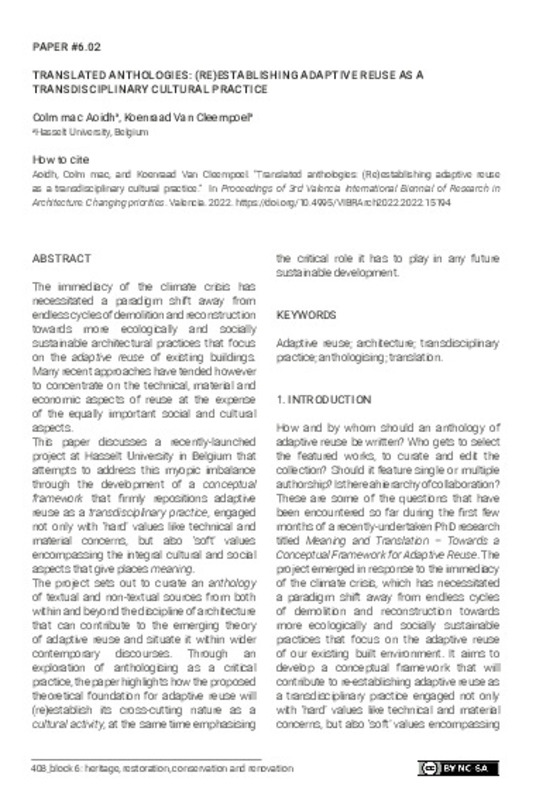JavaScript is disabled for your browser. Some features of this site may not work without it.
Buscar en RiuNet
Listar
Mi cuenta
Estadísticas
Ayuda RiuNet
Admin. UPV
Translated anthologies: (Re)establishing adaptive reuse as a transdisciplinary cultural practice
Mostrar el registro sencillo del ítem
Ficheros en el ítem
| dc.contributor.author | Mac Aoidh, Colm
|
es_ES |
| dc.contributor.author | Van Cleempoel, Koenraad
|
es_ES |
| dc.date.accessioned | 2023-12-21T07:54:19Z | |
| dc.date.available | 2023-12-21T07:54:19Z | |
| dc.date.issued | 2023-05-22 | |
| dc.identifier.isbn | 9788413960265 | |
| dc.identifier.uri | http://hdl.handle.net/10251/200995 | |
| dc.description.abstract | [EN] The immediacy of the climate crisis has necessitated a paradigm shift away from endless cycles of demolition and reconstruction towards more ecologically and socially sustainable architectural practices that focus on the adaptive reuse of existing buildings. Many recent approaches have tended however to concentrate on the technical, material and economic aspects of reuse at the expense of the equally important social and cultural aspects.This paper discusses a recently-launched project at Hasselt University in Belgium that attempts to address this myopic imbalance through the development of a conceptual framework that firmly repositions adaptive reuse as a transdisciplinary practice, engaged not only with ‘hard’ values like technical and material concerns, but also ‘soft’ values encompassing the integral cultural and social aspects that give places meaning.The project sets out to curate an anthology of textual and non-textual sources from both within and beyond the discipline of architecture that can contribute to the emerging theory of adaptive reuse and situate it within wider contemporary discourses. This collected body of knowledge is then examined through the critical lens of translation, investigating the acts of translation involved in reconciling different traces, time periods, interventions and actors, as a way to synthesise the various meanings uncovered and suggest how the intimate and reciprocal relay between theory, practice and education might be strengthened.Through an exploration of anthologising as a critical practice and translation as a critical lens, the paper highlights how proposing a theoretical foundation for adaptive reuse can help reinforce its cross-cutting nature as a cultural activity, at the same time emphasising the critical role it has to play in any future sustainable development. | es_ES |
| dc.format.extent | 12 | es_ES |
| dc.language | Inglés | es_ES |
| dc.publisher | Editorial Universitat Politècnica de València | es_ES |
| dc.relation.ispartof | Proceedings - 3rd Valencia International Biennial of Research in Architecture, VIBRArch | |
| dc.rights | Reconocimiento - No comercial - Compartir igual (by-nc-sa) | es_ES |
| dc.subject | Adaptive reuse | es_ES |
| dc.subject | Architecture | es_ES |
| dc.subject | Transdisciplinary practice | es_ES |
| dc.subject | Anthologising | es_ES |
| dc.subject | Translation | es_ES |
| dc.title | Translated anthologies: (Re)establishing adaptive reuse as a transdisciplinary cultural practice | es_ES |
| dc.type | Capítulo de libro | es_ES |
| dc.type | Comunicación en congreso | es_ES |
| dc.identifier.doi | 10.4995/VIBRArch2022.2022.15194 | |
| dc.rights.accessRights | Abierto | es_ES |
| dc.description.bibliographicCitation | Mac Aoidh, C.; Van Cleempoel, K. (2023). Translated anthologies: (Re)establishing adaptive reuse as a transdisciplinary cultural practice. Editorial Universitat Politècnica de València. 408-419. https://doi.org/10.4995/VIBRArch2022.2022.15194 | es_ES |
| dc.description.accrualMethod | OCS | es_ES |
| dc.relation.conferencename | 3rd Valencia International Biennial of Research in Architecture, VIBRArch | es_ES |
| dc.relation.conferencedate | Noviembre 09-11, 2022 | es_ES |
| dc.relation.conferenceplace | Valencia, España | es_ES |
| dc.relation.publisherversion | http://ocs.editorial.upv.es/index.php/VIBRArch/VIBRArch2022/paper/view/15194 | es_ES |
| dc.description.upvformatpinicio | 408 | es_ES |
| dc.description.upvformatpfin | 419 | es_ES |
| dc.type.version | info:eu-repo/semantics/publishedVersion | es_ES |
| dc.relation.pasarela | OCS\15194 | es_ES |








